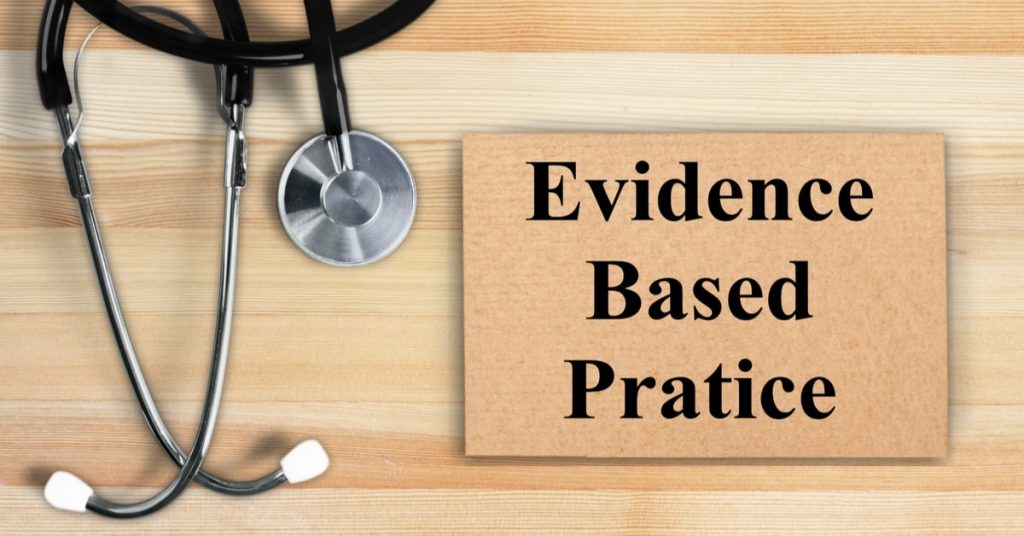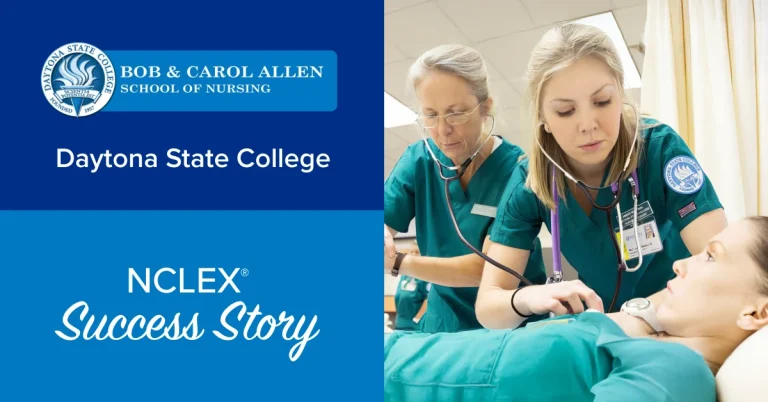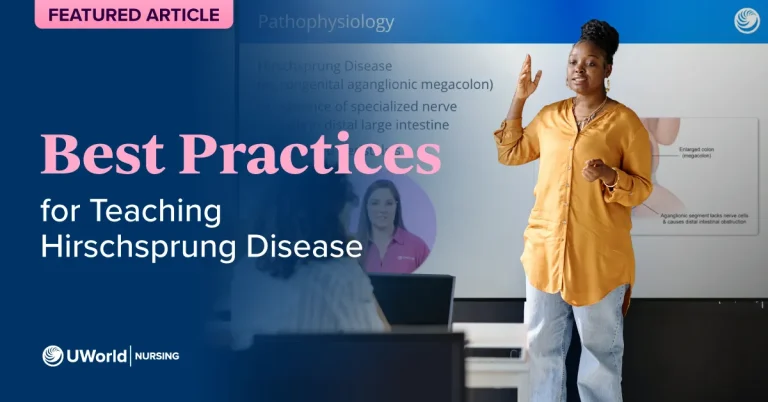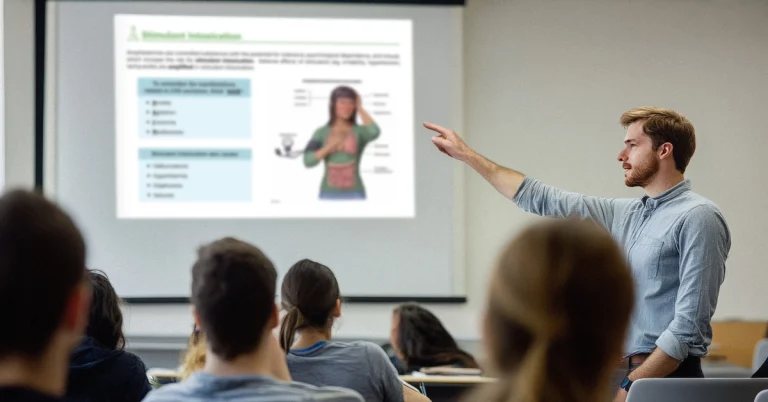Author: Maria Flores-Harris, DNP, RN, CNE
Importance of Evidence Based Practice in Nursing
Nursing programs are judged (I do not use that word lightly) by their first-time NCLEX® pass rates. First-time NCLEX pass rates are the most measured quality indicator in nursing education. Regulatory bodies, accreditation agencies, prospective students and employers, all judge a program by NCLEX pass rates. As nurse educators, we are tasked with and expected to utilize evidence-based practices in nursing to prepare students for the NCLEX and ensure success in our programs.
The reason EBP is a key to success is in the name itself. There is evidence to prove that the strategies are successful! We find evidence-based practices in nursing in peer-reviewed journals and read about them in books published by experts in learning science and instructional design. We attend conferences and listen to experts and are exposed to research that we utilize in our classrooms, labs, and clinical settings.
We should also look to the NCSBN® for their research on the NCLEX. Every three years, the NCSBN provides us with a Practice Analysis, one for RN and one for LPN/LVN. This practice analysis ensures the validity of the NCLEX by connecting nursing practice to the NCLEX. The Practice Analysis is a survey that gathers information about the most common tasks completed and their level of importance from newly licensed, practicing nurses. The information gathered then informs the upcoming changes to the NCLEX. The Practice Analysis ensures that the exam is timely and includes evidence-based practice questions. As nurse educators, we should pay close attention to the Practice Analysis to ensure our own evidence-based approaches meet our program outcomes.
What does the evidence show regarding NCLEX success?
So much has been written and researched regarding NCLEX success, but here are four evidence-based practices that you can use to improve your students’ pass rates on the NCLEX. I chose these four because you will find them repeated in the literature.
Identify at-risk students early
It is imperative that we identify areas for improvement in our students as early as possible. These areas may include content deficits, test-taking concerns, anxiety, and/or non-academic factors. Identification of risk factors can be done in a variety of ways: face-to-face meetings, surveys, observation, and formal test reflection. Faculty should provide timely feedback to help the student improve his or her deficits. Don’t forget to take advantage of the resources available in your academic institutions such as learning centers, testing centers, counselors, etc.
Communication and mentoring
Emails, texts, phone calls, and face-to-face meetings are all acceptable means of communication. Ask your students what is preferable and try to use that method as much as possible. Communication and mentoring should occur throughout the nursing program and after graduation. Yes, I said AFTER graduation! Students need mentoring, guidance, and support even more after graduation. Help them create a schedule for staying on track with completing questions. Send them regular reminders in their preferred method of communication. Provide words of encouragement to keep them motivated.
NCLEX preparation apps may help in providing reminders, encouragement, and keeping students on track. Reputable NCLEX preparation resources, such as UWorld, can provide valid and reliable NCLEX-style questions for practice and provide you and the student with continued evaluation of strengths, weaknesses, and progress.
Practice NCLEX-style questions
Research shows that students should complete NCLEX-style questions and remediate them throughout the preparation process. Once the student graduates, practicing evidence-based NCLEX questions and remediating them should be the bulk, if not all, of their preparation. Practicing NCLEX-style questions allows for continued identification of strengths and weaknesses and remediation of those weaknesses. Practice of similar questions seen on NCLEX also lessens anxiety for the student when they sit for the real exam. Practice truly does make perfect!
Mimic “the real thing”
Evidence proves that completing questions in an NCLEX-like environment lessens anxiety and leads to better outcomes. An NCLEX-like environment includes:
- Using evidence-based NCLEX practice questions, including alternate types (select-all-that-apply, ordered response, exhibit, fill-in-the-blank, and graphic)
- Timing oneself — 5 hour maximum for NCLEX
- Taking at least 75 questions per test
- Taking some 145 question tests
- Having no interruptions while testing
- Having no electronic devices while testing
The problem with EBP and what to do about it
The problem with evidence-based practice in nursing is that when you become laser focused on student learning outcomes, it becomes easy to overlook the students’ experience. I’m not saying that we should strictly rely on what students say they want or like. Learning science research has proven that students often do not know what is good for them when it comes to learning. It’s human nature to want it fast and easy. Learning is often slow and requires effort. All the best techniques in the world will not work if your students do not use them!
When implementing strategies, take the time to explain why the strategy is being implemented and how it will help your students. After implementation, ask for feedback and incorporate the feedback if it makes sense so that students’ voices are heard.
Florence Nightingale said, “Nursing takes a whole life to learn. We must make progress in it every year.” Even in the beginning of the nursing profession, our fellow nurses recognized the need to be life-long learners to succeed. As the evidence for change in practice and teaching is published, nurse educators should be utilizing it. As educators implement and evaluate, we should provide feedback to the researchers for further research. It is a continuous cycle, a life-long cycle for nurses and educators alike, and we must make progress in it every year, every semester, every day!
References
Chorzempa, B. F., Smith, M. D., and Sileo, J. M. (2019) Practice-Based Evidence: A Model for Helping Educators Make Evidence-Based Decisions. Teacher Education and Special Education, 42(1), 82–92.
DOI: 10.1177/0888406418767254 journals.sagepub.com/home/tes
Hanson-Zalot, M., Gerolamo, A. and Ward, J. (2019) The Voices of Graduates: Informing Faculty Practices to Establish Best Practices for Reading NCLEX-RN Applicants. Open Journal of Nursing, 9, 125-136. https://doi.org/10.4236/ojn.2019.92012
McDowell B. KATTS: a framework for maximizing NCLEX-RN performance. (2008). Journal of Nursing Education. 7, 183-188
https://www.ncsbn.org/9010.htm
Stucky, L. C. and Wright, A. N. (2021). Preparing for NCLEX-RN Success: Communication, Support, Mentoring, and Tutoring for New BSN Graduates. Nursing Education Perspectives, 42(2), 128-129
Wilson-Anderson, K. (2022). A Teaching Model to Promote NCLEX-RN Success. Nursing Education Perspectives, 43(2), 132-133





